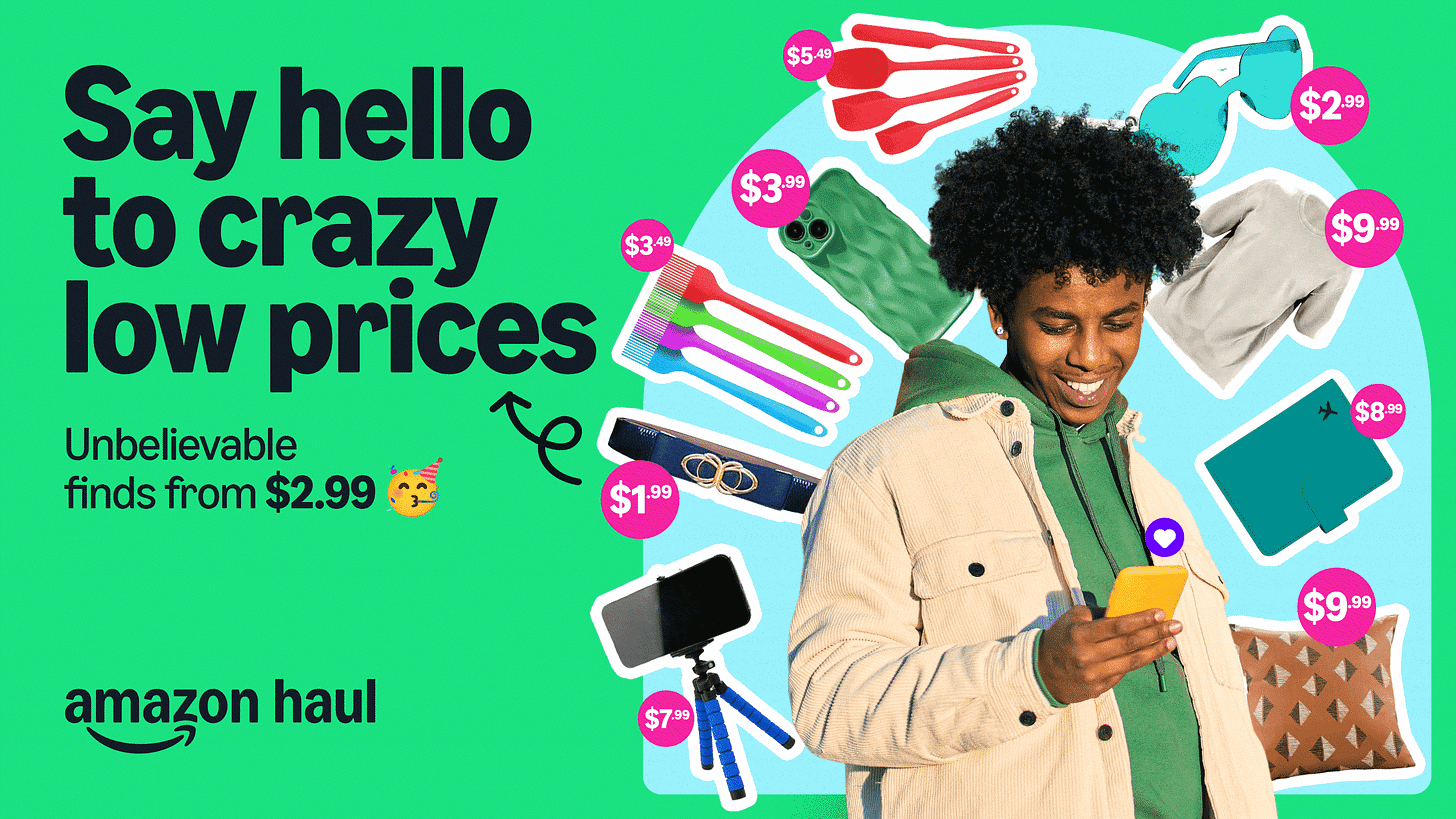Amazon has begun to trial a new low-cost service, Amazon Haul, in the USA. It’s a direct competitor to the likes of Temu and Shein, who both leverage cheap products produced in China, and ship them to American consumers. Everything on Amazon Haul is $20 or less, with most items being priced under $10. The products will receive the same level of customer support as the rest of the Amazon library, including quick delivery and top-notch buyer protection.
Some would argue that the rise of Temu and Shein has caught Amazon off-guard, and it has not adapted to best compete with them. It would, however, be fair to say that the success of the Chinese competitors was at least partially unexpected. It seems though, that their catchy advertising and inexpensive product offerings have been particularly good at drawing customers, particularly younger ones as we explored last week. Despite this, the Amazon brand may yet have an appeal to older consumers who appear to have more brand loyalty.
Competing on price seems to be fashionable. Smaller manufacturers, often finding they are simply unable to achieve the same economies of scale, pivot towards competing on quality. This leads to a particularly distorted market where pricey options are often many times more expensive, yet don’t command the same increase in quality. This makes the cheap option increasingly popular, even if often it is manufactured waste, or highly disposable, like fast fashion.
It should be noted that this business model is reliant on favourable custom arrangements, which look to be increasingly under threat as lawmakers seek to close this loophole. Additionally, the President elect is particularly keen on imposing tariffs on goods from China, which would make these products significantly more expensive.
Samsung glasses
A leak has revealed more information about the Samsung XR glasses, expected to be released in Q3 of 2025. Poised to directly compete with the popular Meta x Ray-Bans, it is set to share similar specs with Qualcomm’s AR1 chip and Google’s Gemini AI.
Like Meta, Samsung seemingly has made the decision to forgo a screen on the glasses. Current technology does not seem to be able to sustain the extra compute, hardware, and power that a screen demands. Samsung is set to release payments and gesture recognition abilities with the new glasses, which Meta lacks for now.
Meta’s collaboration with Ray Bans have been remarkably successful, with the recent launch of the second generation glasses. The form factor they have achieved is very impressive, and it would be difficult for most people to notice the extra weight. The camera and speakers are good quality, and there are legitimate use cases where the glasses would be useful. An example would be to record memories, like a loved one’s birthday, in a discreet but high-quality manner. Apple, meanwhile, wants to convince you to record spacial video to watch on your vision pro. Compared to that, the Meta glasses seem far more sensible.
Sourish had purchased a set a week ago, and was initially sceptical of the price tag. However, he has since warmed to the device, despite not loving the aesthetics. The ability to save memories in first person was a convincing argument for him to keep the device. The build-quality, user experience, and battery life also proved to be better than expected.
TikTok valuation
Bytedance, the Chinese company which owns TikTok, has valued itself at $300 Billion. This news came after they provided a stock buyback offer for employees at this price. However , 2 years ago, they valued themself at the same price, before falling by 26% to just $223 billion.
Bytedance is a private company and thus does not disclose its financials. However, it has experienced incredible growth in recent years, and generated billions in revenue via its flagship app, Tik Tok. Notably though, there have been difficulties interacting with the US government. Initially, former president Trump attempted to ban Tik Tok. President Biden has attempted to do just that - claiming Tik Tok would be banned if they didn’t divest it to an American firm. Whilst this is being challenged in court, president-elect Trump has since changed his mind on this subject, so there is further uncertainty moving forwards.
Chinese Smartphones
Chinese smartphone brands, particularly brands under the BBK Electronics family and Xiaomi, are experiencing heightened growth in the European market. Realme in particular has seen very quick growth globally, having been spun out of Oppo in 2018.
The European market historically has been, and still is, dominated by Apple and Samsung, who make up 94% of premium smartphone sales. Despite this, if the data is disaggregated, Chinese manufactures can be seen to have a greater influence in some market segments. Whilst more well-off consumers in western European countries like the UK are very likely to choose iPhones, in other countries like Spain, Chinese companies like Xiaomi have a much stronger presence. In addition, western manufactures have lagged behind their Chinese peers in the middle to lower end markets, with the latter usually offering significantly better value-for-money in terms of hardware.
Similarly, Chinese companies are more willing to innovate from a hardware perspective. Honor, which was spun off from Huawei after it was sanctioned, overtook Samsung in foldable phone sales in Western Europe. Whilst the folding phone market is tiny, this should serve as a warning to legacy brands who may be unwilling to innovate.
Furthermore, Chinese companies have increasingly stepped up their advertising. Ads at major sporting events like the French Open are attempts at converting Apple and Samsung users to try an alternative. Despite this, these users are particularly brand-loyal, with some claiming that these users are 10 times as costly to convert relative to an impartial customer.
Tune in to our podcast available on Spotify, YouTube, and Apple Podcasts for our full discussion on these topics, and talk to us on X at @the_wafflebyte.


